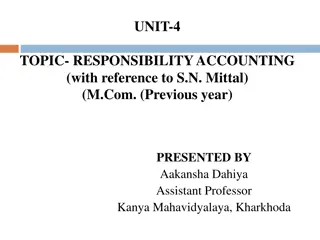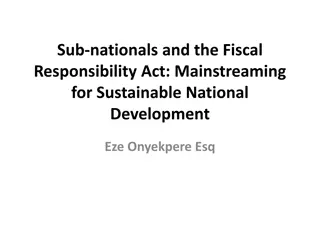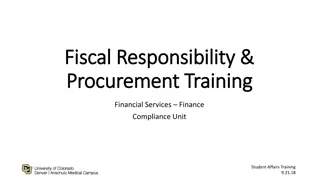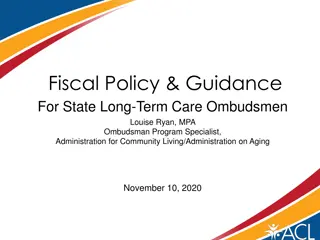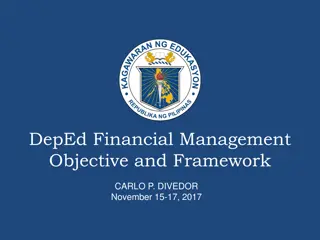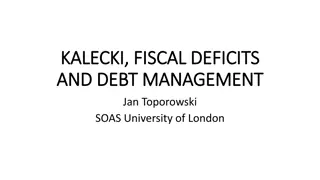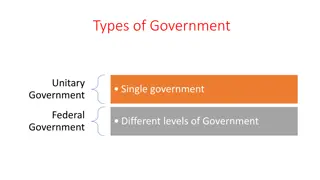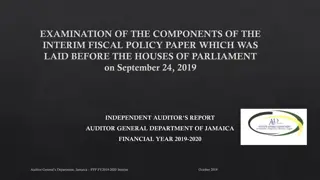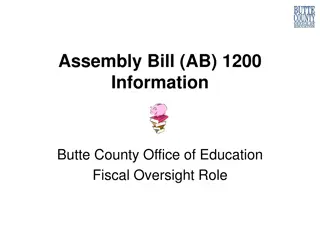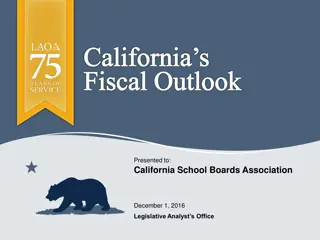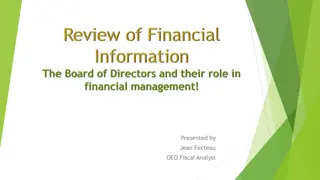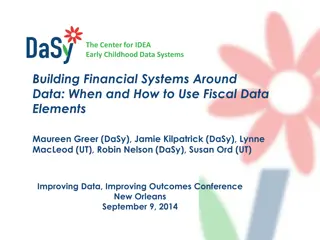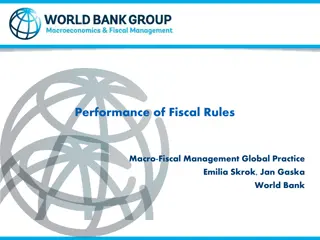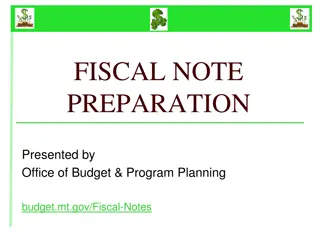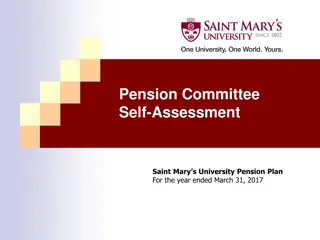School-Based Financial Management and Fiscal Responsibility in Education Governance
School-Based Financial Management and Fiscal Responsibility is crucial for the effective operation of educational institutions. With the implementation of shared governance principles and fiscal autonomy under the School-Based Management System (SBM), schools can efficiently manage their financial resources to support their educational objectives. This includes defining roles, ensuring transparency, and establishing communication channels to enhance accountability at all levels.
Download Presentation

Please find below an Image/Link to download the presentation.
The content on the website is provided AS IS for your information and personal use only. It may not be sold, licensed, or shared on other websites without obtaining consent from the author.If you encounter any issues during the download, it is possible that the publisher has removed the file from their server.
You are allowed to download the files provided on this website for personal or commercial use, subject to the condition that they are used lawfully. All files are the property of their respective owners.
The content on the website is provided AS IS for your information and personal use only. It may not be sold, licensed, or shared on other websites without obtaining consent from the author.
E N D
Presentation Transcript
School Base Financial Management and Fiscal Responsibility FB Hotel and Convention Center, Koronadal City November 15-17, 2017
Republic Act 9155 (Governance of Basic Education Act of 2001) Definition of terms School - is an educational institution, private and public undertaking educational operation with a specific age-group of pupils or students pursuing defined studies at defined levels, receiving instruction from teachers, usually located in a building or a group of building in a particular physical or cyber site. School Heads - are persons responsible for the administrative and instructional supervision of the school or cluster of schools. Non Teaching Personnel - refers to employees who are not actually involved in classroom teaching but indirectly and indispensably assisting in the delivery of service to educational constituencies and clientele, such as but not limited to the Administrative Officers, Accountant, Personnel Officers, Supply officers, Records Officers and other support staff of the central, regional, division, and school levels.
Republic Act 9155 (Governance of Basic Education Act of 2001) Section 1.5. Shared Governance. i. Shared governance as a principle recognizes that every unit in the education bureaucracy has responsibility inherent in the office and of which it is principally accountable for outcomes. a particular role, task, and ii. Democratic consultation shall be observed in the decision-making process involving shared goals at appropriate levels. Whenever and wherever appropriate and feasible, the students, as the object and subject of instruction, shall be consulted on matters that affect their welfare and instructional needs. \operations shall be the responsibility of the operating officer concerned. Feedback mechanisms shall be established to ensure coordinate on and open communication, among the central office, the regional, division offices and school campuses.
Republic Act 9155 (Governance of Basic Education Act of 2001) Section 1.5. Shared Governance. iii. The principle of accountability and transparency shall be operationalized in the performance responsibilities at all levels. of functions and iv. The communication channels of field offices shall strengthen and facilitate flow of information and expand linkages with other government agencies, local government units (LGUs) and non-government organizations governance. (NGOs) for effective
Fund Management under School Based Management System (SBMs) Objective resources, particularly financial assets, is an essential part and a very critical process. Without funds, the best established organizations will not function. Finances are the lifeblood of the organization that allows it to live and develop. And SBM will not be complete if it does not include fiscal autonomy in the management of school funds. Under a School-Based Management System (SBM), management of Fiscal autonomy over school funds dictates that along with the authority to make decisions over school financial resources is the responsibility and accountability for the legal and optimal utilization of such funds to achieve planned outputs and outcomes.
Government Accounting Manual COA Circular 2015-007 dated October 22, 2015 was issued to prescribe the Government Accounting Manual (GAM) for use of all National Government Agencies (NGAs) consisting of department, bureaus, offices and instrumentalities, including state universities and colleges, in accordance with pertinent accounting and budgeting rules and regulations, including the following: a) Commission on Audit (COA) Circular No. 2013-002 dated January 30, 2013 prescribing the Adoption of the Revised Chart of Accounts for National Government Agencies (NGAs);
Government Accounting Manual b) COA Resolution No. 2014-003 dated January 24, 2014 prescribing the adoption of the Philippine Public Sector Accounting Standards (PPSAS); c) COA Circular No. 2014-003 dated April 15, 2014 providing the implementing rules and guidelines on the Conversion from the Philippine Government Chart of Accounts under the New Government Accounting System per COA Circular No. 2004-008 dated September 20, 2004, as amended, to the Revised Chart of Accounts for NGAs; d) COA Circular. No. 2015-002 dated March 9, 2015 prescribing supplementary guidelines on the preparation of financial statements and other financial reports, the implementation of the PPSAS and the coding structure; transitional provisions of the
Government Accounting Manual e) COA-DBM Joint Circular No. 2013-1 dated March 15, 2013 prescribing the revised guidelines on the submission of Quarterly Accountability Reports on Appropriations, Allotments, Obligations and Disbursements; f) COA-DBM Joint Circular No. 2014-1 dated July 2, 2014 prescribing the guidelines on the modified formats of the Budget and Financial Accountability Reports (BFARs); g) COA-DBM-DOF Joint Circular No. 2013-1 dated August 6, 2013 prescribing the Unified Accounts Code Structure (UACS); and h) COA-DBM-DOF Joint Circular No. 2014-1 dated November 7, 2014 providing the enhancement of UACS prescribed under COA-DBM-DOF Joint Circular No. 2013-1.
Government Accounting Manual The Manual The GAM (Annex A) is composed of three volumes, namely: Volume I - Accounting Policies, Guidelines and Procedures, and Illustrative Accounting Entries It contains the general provisions, basic standards and policies, the specific guidelines and procedures for each standard, and the illustrative entries for typical transactions of national government agencies. Volume II - Accounting Books, Registries, Records, Forms and Reports It contains the various formats of books of accounts, registries, records, forms and reports, and the instructions on their use.
Government Accounting Manual The Manual Volume III - The Revised Chart of Accounts (Updated 2015) It contains the List and Description of Accounts per COA Circular No. 2013-002 dated January 30, 2013, amendments per COA Circular No. 2014-003 dated April 15, 2014, and additional/modified accounts.
Government Accounting Manual Repealing Clause The GAM replaces the New Government Accounting System (NGAS) Manual, Volumes I, II and III, prescribed under COA Circular No. 2002-002 dated June 18, 2002. Further, all other circulars, orders, memoranda and existing rules and regulations inconsistent with the provisions of the GAM are hereby amended/modified/revoked accordingly.
Presidential Decree 1445 - State Audit Code of the Philippines Fundamental Principles governing the financial transactions and operations of any Government agency as provided under Section 4 of Presidential Decree (PD) No. 1445: No money shall be paid out of any public treasury or depository except in pursuance of an appropriation law or other specific statutory authority. Government funds or property shall be spent or used solely for public purposes. Trust funds shall be available and may be spent only for the specific purpose for which the trust was created or the funds received. Fiscal responsibility shall, to the greatest extent, be shared by all those exercising authority over the financial affairs, transactions, and operations of the government agency.
Presidential Decree 1445 - State Audit Code of the Philippines Fundamental Principles governing the financial transactions and operations of any Government agency as provided under Section 4 of Presidential Decree (PD) No. 1445: Disbursements or disposition of government funds or property shall invariably bear the approval of the proper officials. Claims against government funds shall be supported with complete documentation. All laws and regulations applicable to financial transactions shall be faithfully adhered to. Generally accepted accounting principles and practices as well as of sound management and fiscal administration shall be observed, provided that they do not contravene existing laws and regulations.
Presidential Decree 1445 - State Audit Code of the Philippines General Requirements for All Types of Disbursement Certificate of Availability of Funds issued by the Chief Accountant Existence of lawful and sufficient allotment duly obligated as certified by authorized officials [except for government-owned and controlled corporations/government financing institutions (GOCCs/GFIs)] Legality of transaction and conformity with laws, rules or regulations Approval of representative expenditure by Head of Office or his authorized Sufficient and relevant documents to establish validity of claim





